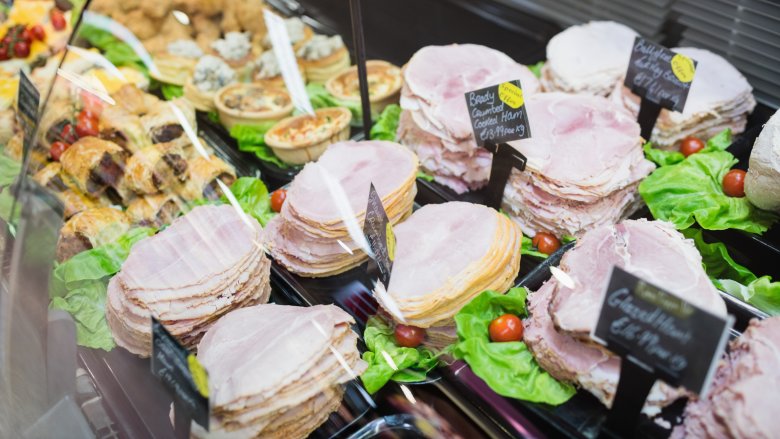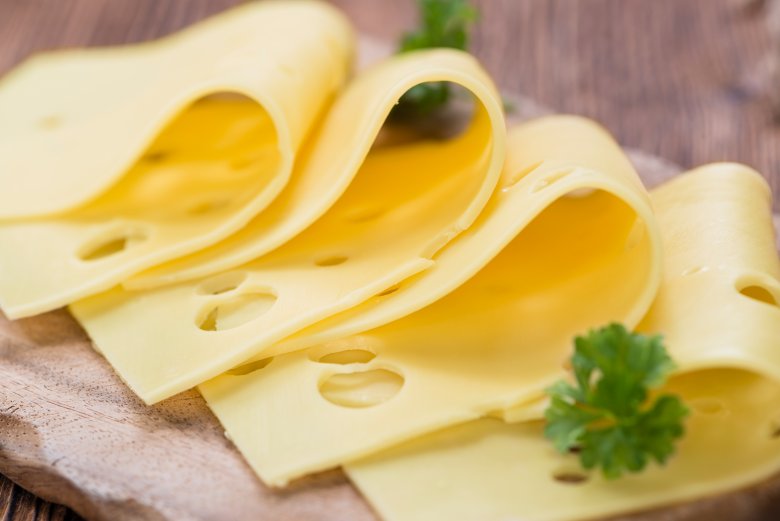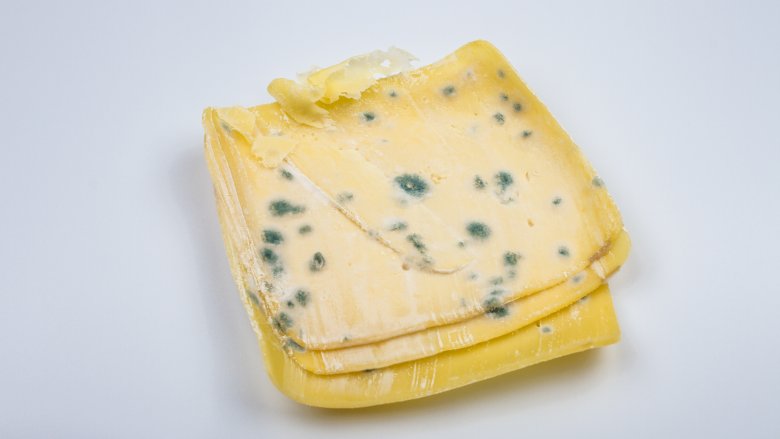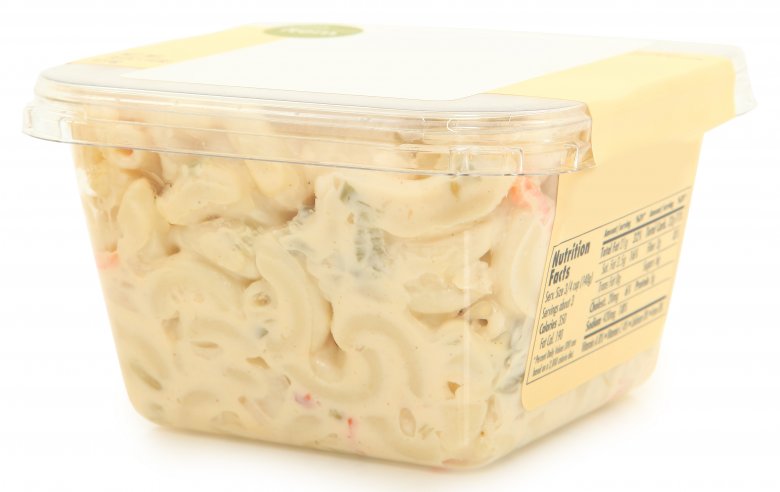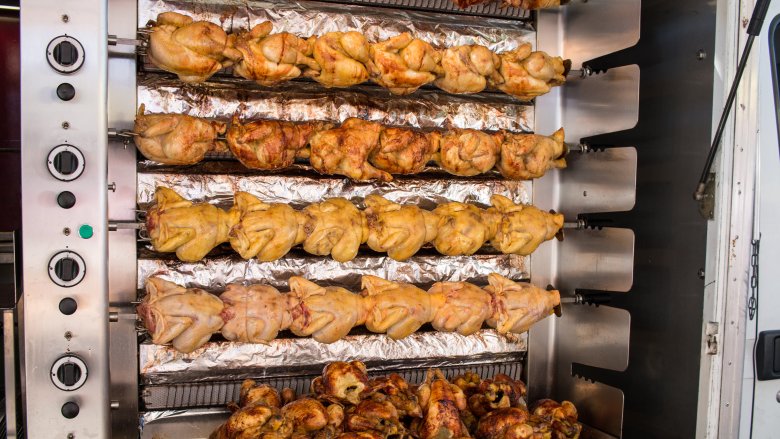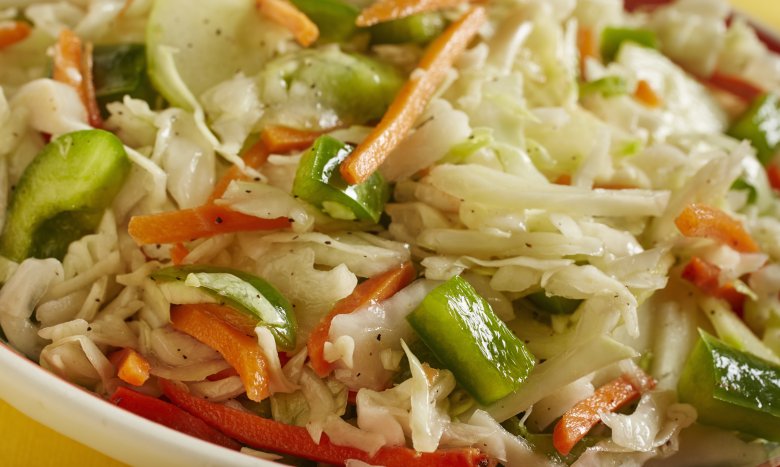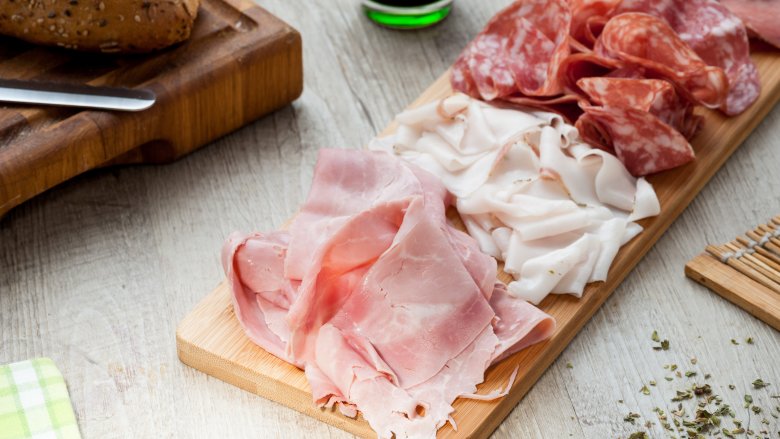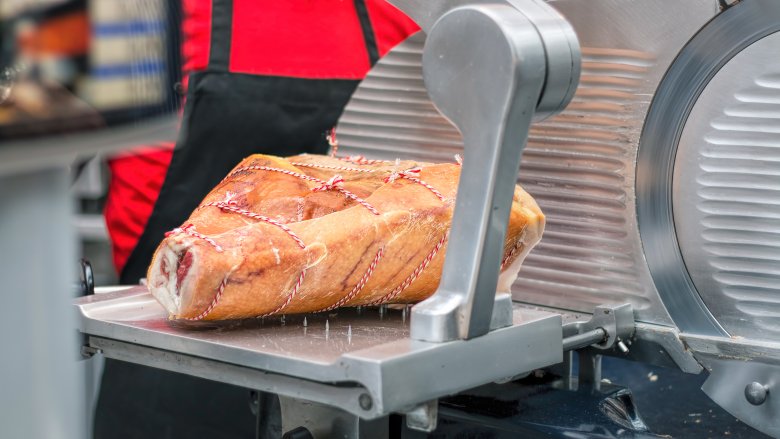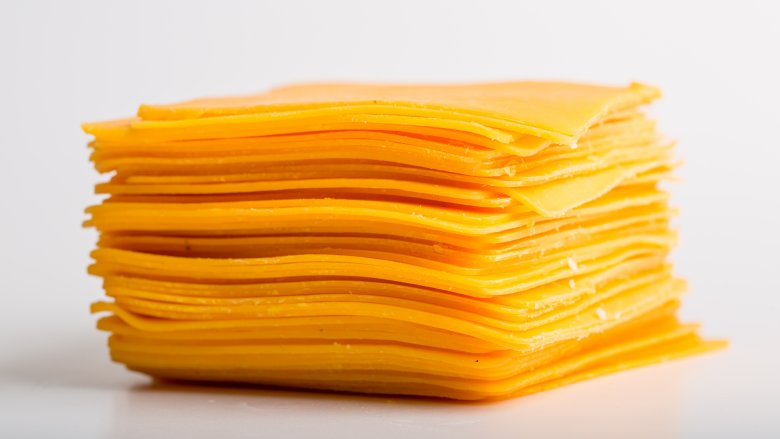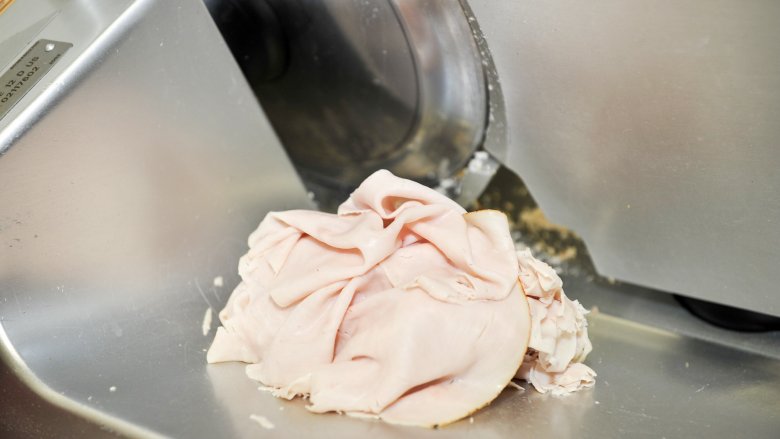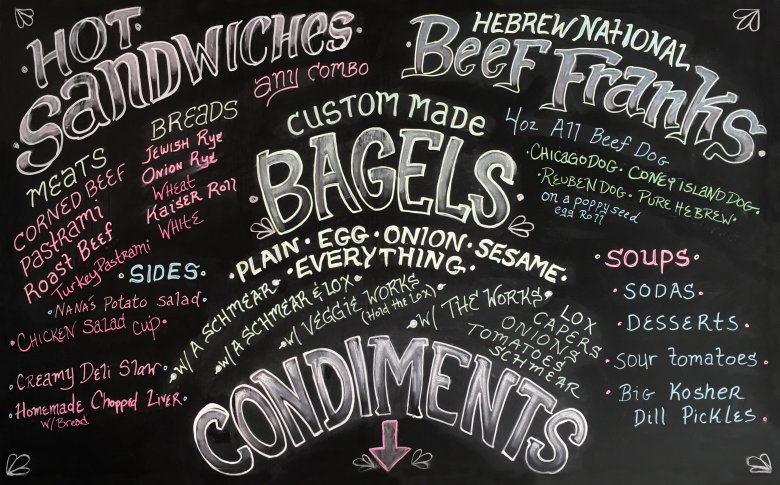The Surprising Truth Of Your Grocery Store's Deli Counter
The grocery store deli counter — the one-stop shop where you can pick up cold cuts for the kid's sandwiches, potato salad for the work potluck, and a to-go lunch on a busy day. Sure it's convenient, but how much do you know about the food you're buying?
Would you think that you needed to worry about moldy cheese? Or about contaminated lunch meat? Or that the moldy cheese you're buying might cost twice as much as the prepackaged stuff? Buckle up, because the deli counter might not be all it's cracked up to be. Here are some surprising truths you need to know.
You're probably paying way too much for cheese
How many times have you, after requesting a pound of roast beef and a pound of Swiss from the deli counter, walked away thinking that there must be some mistake? How could a few slices of meat and cheese cost so much? Turns out, you just might be paying double for some of that custom cut fare.
You know that prepackaged cheese you walked by earlier? On the aisle with the precut meat? If you're ever on a budget, you might want to revisit that aisle. Turns out the pre-sliced cheese can cost half of what it costs to have the deli slice it for you, plus you miss all that meat slicer contamination. But more on that later...
And that overpriced cheese might be moldy
Remember what I just told you about paying too much for fresh sliced cheese? Well, I hate to be the bearer of more bad news, but you might be buying cheese that was previously moldy, too. According to Uproxx writer Stacey Ritzen, who claims to have worked in a grocery store deli, she was instructed to cut any mold off cheese and sell it anyway. (She was also instructed to sell spoiled deli meat. Yum.)
While it is generally considered safe to cut away mold on harder cheeses, I think we can all agree that it's one thing if we choose to do that at home with the hunk of Parm that's been in the back of the fridge for five months, but I'd prefer that the cheese I buy from the deli be mold-free, especially when I'm paying a premium for it. Silly me.
You might want to steer clear of the macaroni salad
Another disconcerting gem from Stacey Ritzen, former deli counter worker: When the pre-packed tubs of macaroni and potato salad expired, she was told to empty them into the bulk case and sell them by weight. Sounds like a good time to perfect your homemade potato salad recipe, or at least stick with the tubs.
The chicken salad might be (way) less than fresh
One last tidbit from Stacey Ritzen, former deli counter worker, and this one's a doozy. She claims that the unsold rotisserie chickens piled up in a refrigerated room in the back until they were picked apart (she says by this point they were rancid) and used to make the bulk chicken salad.
Who else really wants to know where Stacey worked so we can avoid that store at all costs?
You're probably also paying too much for prepared items
It's certainly quicker to pick up a hot meal in the deli, but you're likely paying a lot for the convenience. If you knew that the "fresh" pizza you were buying is the same store-brand pizza from the frozen aisle, would you still fork over the cash?
According to one deli clerk, that's exactly what you'd be buying, and at twice the price per slice. Suddenly "cooking" that frozen pizza yourself doesn't seem like such a big deal, does it?
You might be eating repurposed foods
Have you ever wondered what happens to all that meat and produce that isn't yet spoiled, but isn't exactly what you'd call fresh either? Grocery stores don't like losing money, so when there's an opportunity to save a buck they'll likely take it. In this case, foods that are considered "unfit for sale" might just find a new home in the deli soups and salads.
Now, depending on how close to spoilage these ingredients are, you will either feel really good about eating food that was otherwise destined for the dumpster, or you'll cringe at all the wilted, brown lettuce in your salad.
How deli meat is made might turn you off
If you're one of those people that prefers not knowing what exactly goes into your bologna, you might want to skip ahead...
When it comes to cold cuts, you've got three choices: whole cuts, sectioned and formed, and processed. Here are the basics of how your favorite deli meats are made.
- Whole cuts are roasts or large pieces of meat that are sometimes seasoned with salt or spices, then cooked and sliced. Think turkey breast and roast beef that have an irregular shape. Unsurprisingly, this is your most expensive choice.
- Sectioned and formed products are made by bonding several pieces of meat together to make one larger piece, then additives are used to make the meat pliable before it's shaped by molds. You know that perfectly round sliced turkey and ham? Spoiler alert: Turkeys and pigs aren't actually born that way.
- Processed meats, like sausages, hot dogs, and bologna, are formed with ground or emulsified seasoned meat, and can (but don't always) contain meat by-products like lips, stomach, and heart. Say what you will about a hot dog but sometimes there's nothing better, pork stomach or not.
You might want to go easy on the cold cuts
Would you eat that bologna sandwich every day if it increased your risk of heart disease? You might want to reconsider your habits if slapping a bunch of processed meat between two slices of bread is your go-to lunch.
Sodium nitrate, a preservative found in some deli meats, is thought to cause damage to your blood vessels which can in turn cause your arteries to narrow and harden. And because of the way nitrates can change how the body uses sugar, you're also putting yourself at a higher risk of diabetes. There's also all that sodium and saturated fat to worry about.
If you just can't imagine lunch without a sandwich, the key is to make better choices when it comes to ingredients. Whole cuts, like turkey breast and roast beef, are the best option, and a low-sodium deli meat can cut your salt intake up to 85 percent. When it comes to cheese, Swiss and mozzarella are good bets.
The meat slicer can be a listeria breeding ground
Listeria has been a serious problem when it comes to the deli counter, and the meat slicer is to blame. Because slicers can be difficult to clean, and sometimes just aren't cleaned often enough, they can transfer the bacteria to each cold cut and cheese slice you order.
If you're worried about contamination, the CDC suggests reheating deli meats to 165 degrees to destroy any listeria bacteria, as well as using fresh deli meat within three days of purchase.
Non meat-eaters might be getting more than they bargained for
It happens just about every time I order roast beef and Swiss sliced fresh from the deli — the first few pieces of cheese are smeared with the leftover bits of meat that was cut in the slicer moments before. Now, if you're planning to eat that roast beef and Swiss together, maybe it's not too big of a deal. But if you don't eat meat it is a big deal. You'll want to ensure that your deli counter is using a separate slicer for meats and cheeses, or at least cleaning the machines between orders.
You could get inadvertently glutened
One more piece of bad news about that meat slicer — if you eat a gluten-free diet, that slicer could be your nemesis. While there are plenty of gluten-free deli meats out there, there are still some that contain wheat-based fillers. If these products are cut on a meat slicer, your gluten-free turkey breast is at risk of contamination. If you're worried about gluten, your best bet is to head to the packaged deli meats aisle and avoid the slicer altogether.
You won't get the whole story when it comes to nutrition
Recent changes to the FDA labelling requirements mean that while grocery stores are on the hook to provide some nutrition information (by May 2018), they're aren't required to post anything more than calorie content, and they don't need to post information for all foods.
If you're wondering how many calories are in the made-to-order sandwiches or foods from the hot bar and salad bar, you're in luck, but you'll be in the dark on bulk foods like meat, cheese, and deli salads. Maybe ignorance really is bliss?
